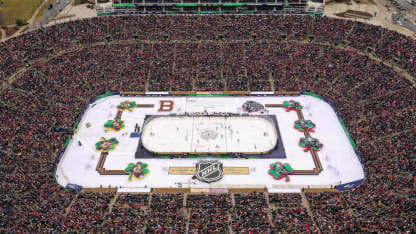The donation will be used to increase access to youth hockey in the Robinson Center's new 13,800 square-foot building, scheduled to open in 2020.
"Our mission, our purpose is to use the sport of hockey to build more vibrant communities," said Jessica Berman, vice president of community development for the NHL. "In this particular program, we're excited to apply those principles into this project, partnering with the Robinson Community Learning Center. We know hockey has the ability to teach life skills to transcend the game, and this project will give us opportunity to demonstrate that.
"It can be, really, a catalyst for access to our game and to our sport, which we know has exponential impact on the community -- particularly with how we're approaching this project, where there's specific programming that's going to be supported by the Blackhawks through their relationship with Notre Dame."
The community center, now housed in a converted grocery store, services approximately 600 people each week. The new building will provide more activities to its visitors, including regular access to hockey clinics and programming.
Hockey equipment, training programs and clinics at the center will be offered through the Blackhawks G.O.A.L. (Get Out and Learn) Program. More than 300,000 students in 650 schools around the Chicago region have participated in the program.
The donation also will provide for a new computer lab, including the Future Goals' Hockey Scholar online program. It employs hockey to teach concepts in science, technology, education and math (STEM) and is targeted to students in grades 4 through 7.
"(The community center) will be bigger. It will actually be built for kids. And thanks to the Blackhawks and the NHL, it will have this really state-of-the-art computer lab," Knapp Beudert said. "It also comes with the Future Goals computer software, so that is a great way to combine sports and academic learning."
RELATED: [Marchand, Bruins soak in Winter Classic experience | Blackhawks lament loss but take away positives]
Also, Compton Family Ice Arena, home of the Notre Dame's hockey teams, will host the Little Blackhawks Learn to Play program this spring. The program, open to children ages 5-9, provides a risk-free entry into trying hockey for the first time. Each participant is provided with free head-to-toe equipment and certified coaching. Five participants will receive a hockey scholarship to the Learn to Play program, which will cover the costs of all fees.
"It's great to leave our legacy with Robinson with the help of the NHL," said Ashley Hinton, director of community relations for the Blackhawks. "We'll be able to make an impact on these kids for years to come."
The Winter Classic itself was also special for those involved with the Robinson Center. A select group was invited to Compton Arena on Monday for the ceremonial check presentation, meeting several Blackhawks players and enjoying a skating session. On Tuesday, the center was provided with 200 tickets to the Winter Classic game, allowing a cross-section of patrons to be part of the second-largest crowd in Winter Classic history.
The legacy initiative, a philanthropic endeavor by the League and its member clubs, has been in place since 2007. More than $1.6 million has been donated to communities across North America.
In the past decade, the legacy projects have aided thousands of hospital patients in recovery, helped at-risk youth and families gain better access to educational and vocational training, and provided greater access to people of all ages to learn and play hockey.

